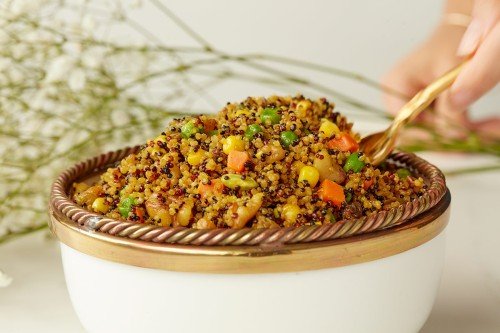
If you’ve had cancer, you may be wondering if you should make any changes to your diet. The Mediterranean diet is often cited for its health benefits. But is it right for you? We asked Alicia Gould, a clinical dietitian at Memorial Sloan Kettering Cancer Center, for information.
What is the Mediterranean diet?
The first descriptions of the Mediterranean diet came out of the island of Crete, in Greece. There, the traditional diet includes lots of fruit, vegetables, beans, and whole grains. Red meat (beef, pork, lamb, or goat) is scarce. The primary source of fat is olive oil. Meals often include wine and are eaten sitting down at a table with other people. These foods and this style of eating have not changed for generations. Compared with what most Americans eat, the Mediterranean diet has about twice the fruit and a tiny fraction of the red meat. Time and again, in studies from around the globe, the Mediterranean diet is associated with a lower risk of stroke, heart disease, cancer, dementia, and many other illnesses.
Similar to the Mediterranean diet, the New American Plate can help people visualize how to fill their plate. Two-thirds of the meal should come from plant-based foods like non-starchy vegetables (broccoli, carrots, and tomatoes, for example), whole grains, beans, and legumes (such as lentils or peanuts). The other third may come from animal protein sources such as seafood, poultry, dairy, and lean red meat (beef, pork, or lamb).
What are the most important parts of the Mediterranean diet?
Many researchers have tried to figure out if one part of the Mediterranean diet makes it so healthy. Some evidence suggests that not eating red meat is the most important part. In all likelihood, it is all important: whole foods, naturally grown, eaten with family and friends.
Is there evidence that the Mediterranean diet is beneficial for cancer survivors?
We conducted a study of adult survivors of childhood leukemia who were overweight or obese. No one was eating a strictly Mediterranean diet. Many survivors had very unhealthy eating habits. Survivors who were eating more fruits and vegetables, less meat, and more whole grains averaged lower cholesterol, better blood sugar levels, and less obesity than those who were eating a lot of meat, salty snacks, and refined grains. Recently, researchers from Germany and Austria pooled data from lots of Mediterranean diet studies. The results did not prove any reduction in cancer-related deaths or cancer coming back. But many individual studies reported benefits to symptoms and treatment-related side effects.
What do you recommend to cancer survivors who want to improve their diet?
Some simple changes can make a diet more Mediterranean.
First, eat less red meat. The recommendation from the American Institute of Cancer Research is no more than 12-18 oz. of cooked red meat per week. That’s three portions, and each portion is about the size of a deck of cards. Survivors should especially avoid smoked, preserved, or salted meats. If you substitute fish and shellfish for red meat, that is good; if you can substitute beans, nuts, and whole grains instead, that is even better, as they are a source of protein but also have fiber and other nutrients that may help cancer survivors.
Second, start eating more fruits. Try eating a whole fruit instead of a processed or ultraprocessed snack. Ultraprocessed food, which includes stabilizers, preservatives, and flavor enhancers, is particularly un-Mediterranean.
Third, think before you drink. While wine is on the menu in Crete, talk with your MSK care team about if you should consume alcohol.
The principles of the Mediterranean diet can be incorporated into many family favorites. This curry quinoa salad is not a Mediterranean dish but is a lovely example of meshing Mediterranean diet principles with flavors from around the world.



